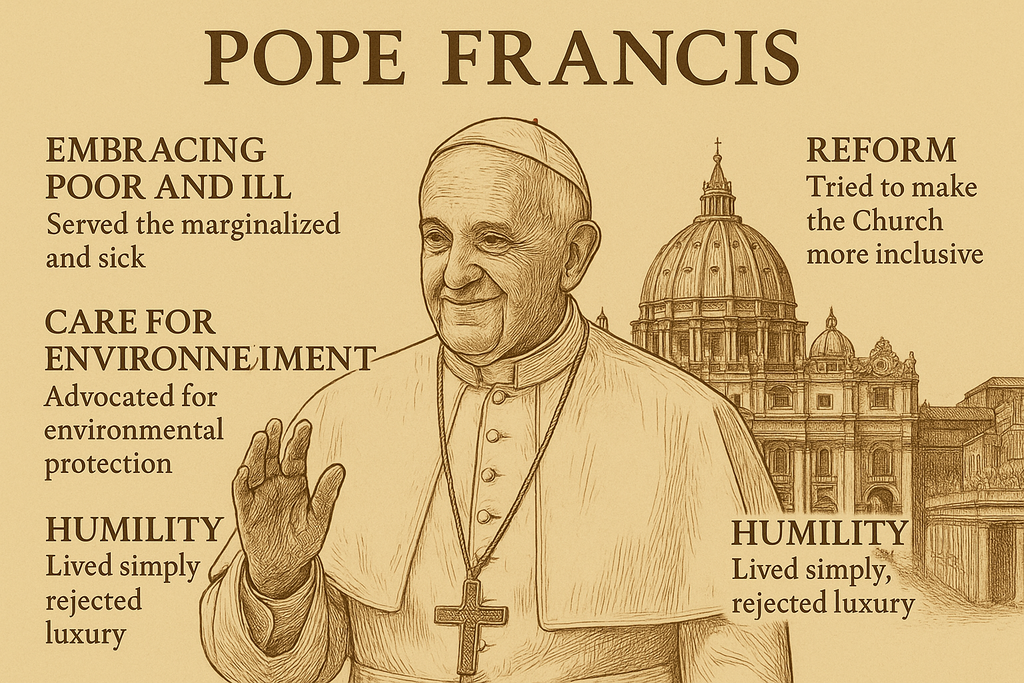Pope Francis a Legacy of Reform
 Image Description: Visual Summary of Pope Francis
Image Description: Visual Summary of Pope Francis
Legacy
Pope Francis mirrors Saint Francis in his radical simplicity, advocacy for the poor, environmental stewardship, and rejection of institutional corruption. His reformist papacy has reshaped the Catholic Church by prioritizing mercy, decentralizing authority, and engaging with modern issues, making it more inclusive and relevant. His universal appeal lies in his ability to connect with people across faiths and ideologies, addressing global challenges with compassion and humility. Like Saint Francis, he has scattered seeds of renewal, though sustaining these changes remains a challenge, as seen in the saint’s own struggles with fading ideals. Learn more
Introduction
Pope Francis, born Jorge Mario Bergoglio, chose his papal name in honor of Saint Francis of Assisi, signaling his intent to emulate the saint’s humility, concern for the poor, and commitment to reform. This document examines the similarities between their actions, why Pope Francis is considered a reformist pope, and how his leadership has resonated globally. An image summarizing Pope Francis’s legacy is included to encapsulate his impact.
Similar Actions Between Pope Francis and Saint Francis
Embracing Poverty and Simplicity
- Saint Francis: Renounced wealth to live in poverty, embracing "Lady Poverty" as a way to follow Jesus’s teachings. He scattered monastic values to everyday people, making spirituality accessible. Learn More
- Pope Francis: Chose a simple lifestyle, rejecting luxurious papal accommodations for a modest Vatican guesthouse room and forgoing ornate vestments. As Archbishop of Buenos Aires, he lived humbly, cooking his own meals and using public transport. Learn More Learn More
Advocacy for the Poor
- Saint Francis: Devoted his life to serving the marginalized, seeing poverty as a path to understanding Jesus’s message. His Franciscan movement grew rapidly due to its focus on the poor. Learn More
- Pope Francis: Emphasized a “church that is poor and for the poor,” prioritizing the marginalized. He has reached out to refugees, the homeless, and slum communities, quadrupling priests in Buenos Aires slums during his tenure. Learn More Learn More
Environmental Stewardship
- Saint Francis: Revered nature, famously preaching to animals and viewing creation as a reflection of God’s love. He is the patron saint of ecology. Learn More
- Pope Francis: Issued the encyclical Laudato Si’, calling for urgent action on climate change and environmental protection, linking ecological harm to its impact on the poor. Learn More
Rejection of Clericalism and Power
- Saint Francis: Criticized ecclesiastical wealth and corruption, founding the Franciscan Order as “Lesser Brothers” to reject status and power. Learn More
- Pope Francis: Denounced clericalism, urging clergy to serve as shepherds, not princes. He criticized Vatican bureaucracy for greed and hypocrisy, implementing financial reforms like those for the Vatican Bank. Learn More Learn More
Interfaith and Ecumenical Outreach
- Saint Francis: Engaged with Muslims during the Crusades, seeking dialogue over conflict, notably meeting Sultan Malik al-Kamil. Learn More
- Pope Francis: Promoted interreligious dialogue, meeting with Muslim leaders like the Grand Imam of Al-Azhar and fostering ecumenism, including commemorating the Protestant Reformation with Lutherans. Learn More Learn More
Pope Francis as a Reformist Pope
Pope Francis’s reformist nature stems from his alignment with the Second Vatican Council’s vision, emphasizing mercy, collegiality, and a church open to the world. Learn More
- Structural Reforms: Established the Council of Cardinal Advisers to decentralize Vatican governance and reform the Roman Curia, a move hailed as a historic shift toward collegiality. Learn More Learn More
- Cultural Shift: Rejected legalism and clericalism, promoting a “field hospital” church that prioritizes compassion over dogma. His synods encouraged open debate, breaking from past suppression of dissent Learn More Learn More
- Moral Theology: Focused on scripture and Jesus’s command to love, softening the church’s stance on issues like divorce, remarriage, and LGBTQ+ inclusion without altering doctrine. Learn More Learn More
- Global Perspective: As the first non-European pope in over 1,200 years, he diversified cardinal appointments, reflecting a global church and addressing non-Western concerns. Learn More
His reforms, though slow and met with resistance from conservatives, aim to make the church more inclusive, transparent, and responsive to modern challenges, echoing Saint Francis’s call to rebuild a corrupt church. Learn More Learn More
Why Pope Francis Was Good for All People
Pope Francis’s papacy transcends Catholicism, resonating with diverse groups due to his universal messages:
- Inclusivity: His welcoming stance toward atheists, Buddhists, and marginalized groups like LGBTQ+ individuals and divorced Catholics broadened the church’s appeal. His phrase, “Who am I to judge?” became a global symbol of acceptance. Learn More
- Social Justice: Advocated for refugees, the poor, and victims of injustice, challenging global leaders on immigration, income inequality, and human trafficking. Learn More Learn More
- Environmental Advocacy: Laudato Si’ positioned him as a moral voice on climate change, influencing secular and religious audiences alike. Learn More
- Humility and Authenticity: His simple lifestyle and public apologies, like after slapping a woman’s hand, humanized the papacy, making it relatable. Learn More
- Interfaith Leadership: His outreach to other faiths and secular communities fostered peace and dialogue, notably in conflict zones like Ukraine and the Middle East. Learn More Learn More
Pew Research found 28% of U.S. adults viewed the Catholic Church more positively due to Francis, with liberals and Democrats especially appreciative, showing his broad impact. Learn More
